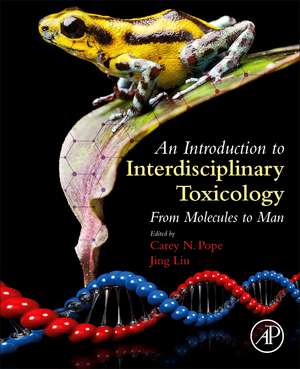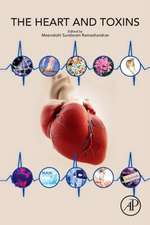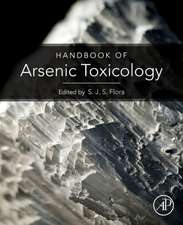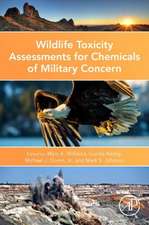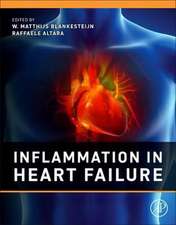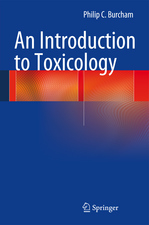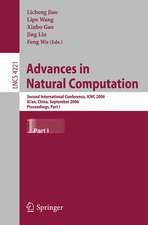An Introduction to Interdisciplinary Toxicology: From Molecules to Man
Editat de Carey N. Pope, Jing Liuen Limba Engleză Paperback – 21 feb 2020
The book allows students to concurrently learn concepts in both biomedical and environmental toxicology fields, thus better equipping them for the many career opportunities toxicology provides. This book will also be useful to those wishing to reference how disciplines interact within the broad field of toxicology.
- Covers major topics and newer areas in toxicology, including nanotoxicology, Tox21, epigenetic toxicology, and organ-specific toxicity
- Includes a variety of perspectives to give a complete understanding of toxicology
- Written by specialists within each subject area, e.g., a chemical engineer, to ensure concepts are clearly explained
Preț: 730.29 lei
Preț vechi: 947.14 lei
-23% Nou
Puncte Express: 1095
Preț estimativ în valută:
139.74€ • 146.29$ • 115.63£
139.74€ • 146.29$ • 115.63£
Carte tipărită la comandă
Livrare economică 29 martie-12 aprilie
Preluare comenzi: 021 569.72.76
Specificații
ISBN-13: 9780128136027
ISBN-10: 0128136022
Pagini: 644
Dimensiuni: 191 x 235 x 29 mm
Editura: ELSEVIER SCIENCE
ISBN-10: 0128136022
Pagini: 644
Dimensiuni: 191 x 235 x 29 mm
Editura: ELSEVIER SCIENCE
Public țintă
Graduate students and advanced undergraduate students in toxicology programs. Students and researchers in medicine, environmental sciences, neuroscience, food sciences, computing, and fundamental life sciences needing information about toxicology information in their discipline.Cuprins
I. General Concepts
1. Principles
2. Sources of exposures: Point vs Nonpoint Source Contamination
3. How chemicals distribute in the physical environment
4. How chemicals distribute in cells and simple organisms
5. How chemicals distribute in complex organisms
II. Responses to chemical toxicants
6. Cellular responses to toxicants
7. Genotoxicity and epigenetics
8. Carcinogenesis
9. Disruption of cell signaling
10. Altered development and reproduction
11. Microbiome alterations and modulation of toxicity
12. Nanotoxicology
III. Organ System Effects
13. Dermal system
14. Gastrointestinal system
15. Excretory system
16. Respiratory System
17. Cardiovascular system
18. Musculoskeletal system
19. Endocrine system
20. The immune system
21. Visual system
22. Nervous system
IV. Ecosystems and Ecotoxicology
23. Organism vs population
24. Bioconcentration
25. Biomarkers
V. Toxicology in the Home
26. Opiates and other therapeutics
27. Cleaning products
28. Petroleum products
VI. Toxicology in the Community
29. Historical case studies
30. Social factors in community contamination
VII. Forensic Toxicology
VIII. Regulatory Toxicology
31. Toxicity testing
32. Tox21
33. Principles of Risk Assessment
IX. Reference materials and websites
34. Information Resources in Toxicology, 4th edition.
35. National Toxicology Program
36. National Center for Toxicological Research
37. FDA
38. EPA
1. Principles
2. Sources of exposures: Point vs Nonpoint Source Contamination
3. How chemicals distribute in the physical environment
4. How chemicals distribute in cells and simple organisms
5. How chemicals distribute in complex organisms
II. Responses to chemical toxicants
6. Cellular responses to toxicants
7. Genotoxicity and epigenetics
8. Carcinogenesis
9. Disruption of cell signaling
10. Altered development and reproduction
11. Microbiome alterations and modulation of toxicity
12. Nanotoxicology
III. Organ System Effects
13. Dermal system
14. Gastrointestinal system
15. Excretory system
16. Respiratory System
17. Cardiovascular system
18. Musculoskeletal system
19. Endocrine system
20. The immune system
21. Visual system
22. Nervous system
IV. Ecosystems and Ecotoxicology
23. Organism vs population
24. Bioconcentration
25. Biomarkers
V. Toxicology in the Home
26. Opiates and other therapeutics
27. Cleaning products
28. Petroleum products
VI. Toxicology in the Community
29. Historical case studies
30. Social factors in community contamination
VII. Forensic Toxicology
VIII. Regulatory Toxicology
31. Toxicity testing
32. Tox21
33. Principles of Risk Assessment
IX. Reference materials and websites
34. Information Resources in Toxicology, 4th edition.
35. National Toxicology Program
36. National Center for Toxicological Research
37. FDA
38. EPA
